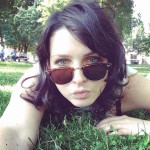“I must be honest, there is a refugee camp across the street in the school’s sports hall at the moment,” she said, our new landlady. It had just opened a couple of days before, so she didn’t yet know what kind of impact it would have on the area, but she thought that she should tell us before we decided to move in. “That seems good,” I said. “It seems important,” my husband said. She took us to her window and we watched the camp from above through the skylights, the children running around the huge hall the way that children always run around gymnasiums, only this time weaving in and around rows and rows of makeshift beds. I felt quietly relieved that our new apartment, in the same building, would be facing in the opposite direction.
“Where are you from?” she asked. I’m from England. He’s from France. We moved to Berlin almost a year ago. We met in Brooklyn. She’s not surprised. We’re not unusual. So many people you meet in this city tell some variation of a similar story. So many people you meet in this city seem to be some sort of transplant.

By Moshood Adekunle
We moved our things in. We took a taxi. We went to IKEA. We bought curtains and pillows and rugs and pans. We said, this is our first real apartment together. We had been living together for a year and a half already. We had been married for six weeks. We said, this is our first time living south of the Spree. I asked, was this West Berlin or East Berlin? And my husband said West, but I didn’t believe him. Sometimes, now, I can go for weeks without thinking about The Wall. When we first arrived, it was all I talked about.
The first night in the new apartment, we attended a symposium close to Jannowitzbrücke, organized and hosted by a Brazilian poet friend of ours. The symposium, which was centred around a convivial discussion, based on a format devised in ancient Greece, was focused on the subject of community. We didn’t know what to expect from it, but when we arrived, there was a lot of food and a lot of wine and the conversation, which was mainly conducted between a panel of eight notable people, but also extended periodically into the audience, was filled with personal insight, empathy and political awareness. It felt fun. Listening to a diverse group of people who all lived in Berlin discussing their ideas about what community meant to them felt surprisingly affirming. Surprising to me, as someone who had felt like an alien since arriving here almost a year before. But for that night, it was all out in the open. For a moment, I felt like I was a part of something. I invited people I had just met to come over for dinner sometime soon, excited about our new place. We don’t have a sofa yet, I told them. But we can sit on the floor. We’ll buy cushions.
As we exited the symposium, my husband told me that his dad had been trying to call him. He had gotten through for a minute and said something that sounded like, “sixty people in Paris are dead,” but they couldn’t really hear each other. We took the subway back without paying. We talked about blow jobs. It was Friday night, we were wasted, having forgotten to eat more than a salad. We stopped and bought gemüse kebaps. I vomited mine on to the sidewalk. It was the first night it actually felt like winter and I was wearing my fancy black coat.
On arriving home, my husband immediately passed out on the bed. I sat beside him and, through the portal of my phone, began to understand what his Dad had been trying to tell us. It became clear, very quickly, that there had been a major terrorist attack on Paris. Several of them. I stayed up and responded to messages from both of our families.
My Mum in England,
My sister in Barcelona,
His brother in New Zealand,
His Dad in San Francisco,
His sister in New York,
His Mom in Paris.
Everyone we knew was safe, as far as we were aware.
By then, almost 130 people were dead in Paris.
I was alone in Kreuzberg and our friends were messaging me with concern, too. We left Paris twelve days ago, we’re not there, I said. “As far as we’re aware, everyone we know is safe.” I couldn’t make any sense of those words. The internet was talking about praying. I put down my phone and tried to go to sleep. The room was gently spinning.
I remembered the dinner we had enjoyed two weeks earlier with my new in-laws, at a restaurant in the seventh. It had been Saturday night. We were celebrating getting married. We ate chestnut soup and conchiglioni. We drank delicious, expensive wines. Crossing the street to a bar afterwards, we passed a homeless family sitting on the ground. A mother and two babies fast asleep, wrapped in blankets, with hundreds of people walking by. My mother-in-law said that it was probably safer for them to rest now, rather than later at night. I pulled a bar of chocolate out of my bag and placed it onto their sleeping bodies. We gave them some change. Afterwards, I asked my husband if he thought they were refugees from Syria and he said maybe, but who can say. I tried to imagine a life in which sleeping on the streets of Paris was my safest option. I couldn’t do it.
The second day, and the first morning in our new apartment, I was awake first and I relayed the news to my husband: 130 people were dead in Paris. He charged his phone and began reading the updates. “I have been to that restaurant,” he said. “My friend from high school was at the show,” he said. “He survived, though.” This was the second time this year that I had not known how to help him in a situation like this one. This was the second time this year that his home city had come under attack. We were quiet for most of the morning, and then later, hungover, took a long, pointless bike ride through the autumn of Berlin. It was easy to feel far away, easy to be distant.
The next day on the U-Bahn, the controller told us to get off the train. He said that we were taking a round trip, which was forbidden on a single ticket. We said we were not taking a round trip and explained our route. He said, “Show me your IDs” and entered our details into his handheld machine. I said, “I’m not paying a fine, I already paid for a ticket.” He told me I wouldn’t have to pay it and handed me a fine for sixty euros. He said, “Take this to the BVG office and explain what happened.” He said, “I can’t make that decision. Only my boss can.” I said, “This is stupid.” He said, “I’m just doing my job.” I thought Aryan men in positions of power ought to be a little slower to use that expression, but suspected saying so would only cause me further, unnecessary problems. One stop away from home, we walked the rest of the journey together in the rain.
Later, I emailed with friends in Sydney and New York about something else. Editing a magazine. I mentioned in passing that my husband keeps overreacting to things and that I don’t know how to help him. I mentioned that I have to keep reminding myself that the terrorist attacks on Paris are causing us different kinds of stress. My friends in Sydney and New York implored me to be very patient with him. My friends in Sydney and New York said they had both been crying about Paris.
Neither one of us has cried, at all, in our new apartment in Berlin.
Sometimes when I’ve been alone in buildings here, I have imagined Nazi soldiers rushing in and shouting things at me. What that would have felt like. How this city has been through so much. How this is the safe place now. How this world suffers from eternal conflict.
In this new apartment, the living room is plastered with 70s wallpaper and I want to know if it has really been here since the 70s. I want to know what’s underneath. I want to know, but I’m afraid of what these walls would say if they were ever given the chance to tell their stories. We don’t have very much furniture yet, but it feels more similar to a start-up right now, rather than a refugee camp. We live in a big, empty apartment, across the street from where 120 Syrian refugees sleep inside of a gymnasium. Our most pressing problem is that we are waiting on Wi-Fi installation. It could be up to three weeks.
By the canal this morning, I saw a group of men from the sports hall, from Syria, standing on the edge of the water, smiling and laughing together. They were feeding the swans. Five or six adult men, feeding swans together, on a grey, cloudy Monday morning in Berlin. Smiling. It was one of the most peaceful sights I have ever seen.
But a little further along my walk, I watched a border collie barking and chasing another flock of birds from the canal bank and back into the water, and I watched as the magnificent creatures retreated. Those swans could kill you, I thought, silently addressing the dog. Be careful of where you start trouble. I walked back into my apartment, just next to the canal, with the sports hall illuminated on the other side of the street. The distance between the conflict and I growing ever closer. The ripples in the water expanding.
 Lucy K Shaw is the author of The Motion (421 Atlanta, 2015) and the founding editor of Shabby Doll House. She lives in Berlin.
Lucy K Shaw is the author of The Motion (421 Atlanta, 2015) and the founding editor of Shabby Doll House. She lives in Berlin.